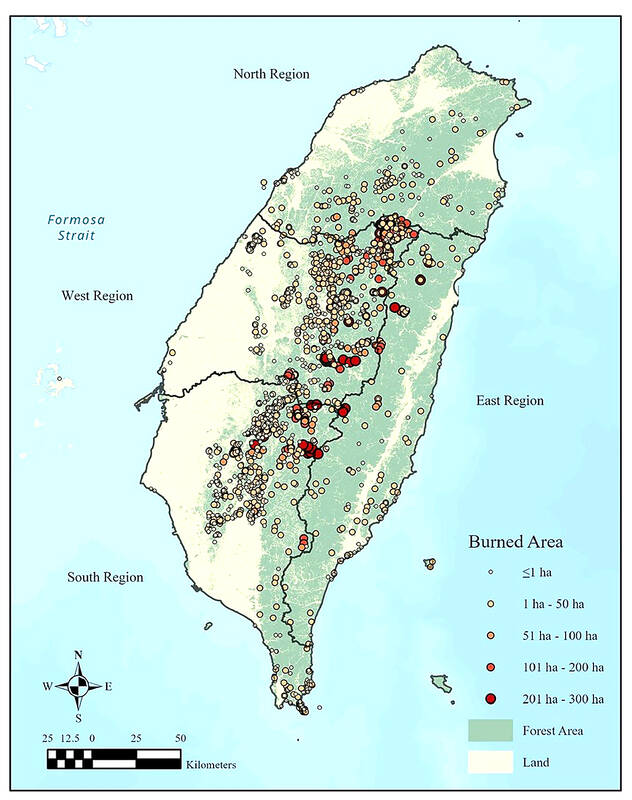Climate change has increased the risk of wildfires in Taiwan, especially in the dry season from November to April, a study published in the international journal Climatic Change found.
The study was jointly submitted by teams from National Chung Hsing University and Utah State University, and was published last month.
The peak season for wildfires has moved forward due to rain patterns and rising temperatures, the study said.

Photo courtesy of National Chung Hsing University
While Taiwan has rarely experienced large-scale wildfires due to its large number of evergreens and its high humidity, recent fires highlight the urgency for the country to adopt preventive strategies amid a changing climate, it said.
Using the Fire Weather Index and multiple climate model simulations, the study assessed and predicted weather patterns from 2021 to 2100, and found that the risk of severe wildfires in Taiwan would increase noticeably.
Northern and central Taiwan were deemed to be at greater risk of wildfires, the study found.
“Incorporating advanced climate projections into wildfire risk management will enable Taiwan to develop more effective strategies to mitigate the impact of forest fires,” said study coauthor Simon Wang (王世宇), a professor of climate dynamics at Utah State University’s College of Agriculture and Applied Sciences.
It is good that the Ministry of Agriculture is developing relevant assessment systems, he said.
He also urged the drafting of legislation to promote fire prevention education and other measures to slow the pace of climate change and reduce the threat to Taiwan’s overall safety and diverse ecosystem.
“Our findings reveal a future where wildfire risks are significantly heightened, demanding a re-evaluation of our fire management strategies,” said study coauthor, Liu Wan-yu (柳婉郁), a professor at National Chung Hsing University’s Department of Forestry.

The first global hotel Keys Selection by the Michelin Guide includes four hotels in Taiwan, Michelin announced yesterday. All four received the “Michelin One Key,” indicating guests are to experience a “very special stay” at any of the locations as the establishments are “a true gem with personality. Service always goes the extra mile, and the hotel provides much more than others in its price range.” Of the four hotels, three are located in Taipei and one in Taichung. In Taipei, the One Key accolades were awarded to the Capella Taipei, Kimpton Da An Taipei and Mandarin Oriental Taipei. Capella Taipei was described by

EVA Airways today confirmed the death of a flight attendant on Saturday upon their return to Taiwan and said an internal investigation has been launched, as criticism mounted over a social media post accusing the airline of failing to offer sufficient employee protections. According to the post, the flight attendant complained of feeling sick on board a flight, but was unable to take sick leave or access medical care. The crew member allegedly did not receive assistance from the chief purser, who failed to heed their requests for medical attention or call an ambulance once the flight landed, the post said. As sick

The Taichung District Court yesterday confirmed its final ruling that the marriage between teenage heir Lai (賴) and a man surnamed Hsia (夏) was legally invalid, preventing Hsia from inheriting Lai’s NT$500 million (US$16.37 million) estate. The court confirmed that Hsia chose not to appeal the civil judgement after the court handed down its ruling in June, making the decision final. In the June ruling, the court said that Lai, 18, and Hsia, 26, showed “no mutual admiration before the marriage” and that their interactions were “distant and unfamiliar.” The judge concluded that the couple lacked the “true intention of

Minister of Economic Affairs Kung Ming-hsin (龔明鑫) yesterday said that private-sector refiners are willing to stop buying Russian naphtha should the EU ask them to, after a group of non-governmental organizations, including the Centre for Research on Energy and Clean Air (CREA), criticized the nation’s continued business with the country. While Taiwan joined the US and its Western allies in putting broad sanctions on Russia after it invaded Ukraine in 2022, it did not explicitly ban imports of naphtha, a major hard-currency earner for Russia. While state-owned firms stopped importing Russian oil in 2023, there is no restriction on private companies to